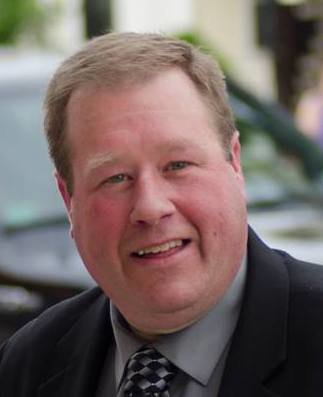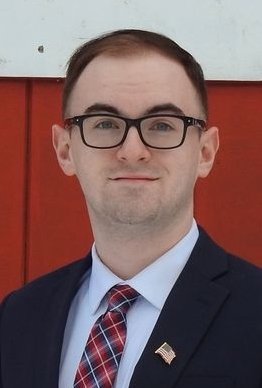Assembly District 102: GOP’s Tague defending seat from newcomer Dem Chase
HILLTOWNS — In the rural 102nd Assembly District, voters who are concerned about the state of agriculture in New York will have their choice between two candidates who each prioritize farmers’ concerns and rural economies, and acknowledge the representational imbalance between upstate and downstate New York.
The first is Republican incumbent Christopher Tague, a dairy farmer-turned-business executive who became an assemblyman in 2018 when he won a special election to replace Peter Lopez, also a Republican. Tague frequently voices his disdain for what he calls one-party rule in New York State, which has a Democratic majority in both houses of the legislature as well as a Democratic governor; he blames this for policies that he feels disregard farmers and other small-town residents.
Tague’s challenger, Democrat Nicholas S. Chase, is a political newcomer who, according to his website, grew up on a small farm in Delaware County and, though he makes his living as a long-term substitute teacher in Schenevus, hopes that he’ll be a “constant reminder that farmers are an essential part of our economy” in the state assembly. He wrote that farmers need a strong voice to cut through downstate concerns, and favors property tax breaks for small farmers.
Chase has raised $10,908.75 — $6,600 of which was contributed by himself, according to the state’s board of elections; Tague, meanwhile, has raised $68,784.05 since the beginning of the year.
The Enterprise spoke with Tague earlier this month in a recorded video interview — which is posted online at altamontenterprise.com — to get his stance on five major state-wide issues facing voters this election, along with his own primary concerns. Chase could not be reached for an interview, leaving his position on some topics, like statewide assessments, unknown, though his website offers some of his thoughts on others, including gun control and healthcare.
Tague
In contrast with some of those in his party who falsely believe that former President Donald Trump had won the 2020 election, Tague said that he acknowledges Joe Biden as the “duly elected” president of the United States, and feels that respect and civility between one another is part and parcel of a functioning democracy.
“Democracy is based on the government, whether the government overreaches or not,” he said. “In this country, unfortunately, we are so split and there’s so much hatred amongst each other.”
He recalled growing up “in a community where Republicans and Democrats actually got along,” and invoked the memory of his father, who he said was at one point the Schoharie County Treasurer. When the elder Tague was running for that office, he and his opponent would meet at a local diner in the middle of election season.
“They had breakfast together, and they would campaign against each other,” Tague said. “At the end of the day, they were still friends — they cared about this country, they cared about the government, they cared about the people.”
He went on to namecheck the Lieutenant Governor and former Democratic Congressman Antonio Delgado as an example of a politician across the aisle who, though they have “lots of policy disagreements” between them, he respects and is civil toward.
“That’s the biggest thing — the loss of respect,” Tague said in summary.
With regard to the environmental bond act, Tague is overall unsupportive, but said that he feels environmental conservation is an important effort.
Of the proposed $4.2 billion bond act, he said, “In typical Albany fashion, the majority has lumped in radical policy changes that would drastically affect the overall wellbeing of our energy supply, our food production — and that’s going to add expenses to individuals and businesses in the state.”
Tague suggested that healthy progress in the state — in any domain — should occur at a slower rate, and rely less on lumped-together bills that obscure the value of what could be “stand-alone bills” that are voted on and addressed individually.
“As far as fossil fuels, I think that we have some great ideas, and I support some of them, but we’re going way too fast,” he said. “First of all, the electric grid cannot handle just switching to electrification right away. It’s nowhere near ready. Secondly, the technology is not there with electric vehicles.”
A friend of his from downstate who needed to make a trip to Buffalo in an electric vehicle, he said, could only drive four hours before having to stop to recharge — but the charging station was full, so he had to wait two more hours.
“Then it took him four hours to get a full charge to be able to drive from [Westchester] to Buffalo,” Tague said. “So a trip that should have taken six-and-a-half, seven hours, ended up into 10 or 12 [hours]. My thing is that we’re on the right track; we need to slow down and do it right.”
On abortion, Tague said that he’s “a devout Irish-Catholic” who is firmly pro-life, but that he would be comfortable leaving a degree of power in the hands of doctors and pregnant women in the event of a rape or medical emergency.
He also said that he does not support a federal ban on abortion, believing that it’s a state matter, and he advised, “They are not going to ban abortion in New York State … Everybody keeps making a big deal out of abortion in New York State. It’s codified. It’s not going to change in New York State.”
Of gun legislation, Tague was especially vocal — identifying himself as a “big” supporter of the Second Amendment and endorsee of the New York Rifle and Pistol Association thanks to his gun-rights positions.
“Our friends in the majority have tried to take constitutional rights away from Americans and New Yorkers,” he said. “It’s wrong. Without a constitution, you have no country.”
He said the recent legislation was a “knee-jerk reaction to two terrible tragedies” that fails to address what he feels is the root of the cause — mental health, and keeping guns “out of the wrong hands.”
On assessment standards, Tague — as virtually all candidates have this year — supported a single-standard to level things out for residents.
“What I proposed is that it should be at the county level,” he said. “There should be folks at the county level, and there should be a standard for each area where the rural areas should be a little bit different than the city and the city area.”
He added that there’s been some progress in recent years with increased training for assessors, “but there is more to do.”
After answering Enterprise questions, Tague addressed three primary concerns he has for the state, which have to do with crime, inflation, and agriculture.
Bail reform, he said, “was a complete failure … We have repeat offenders continually breaking the law and being let out of jail to commit crimes again.”
Judges, he said, and in particular rural judges who deal in smaller populations, are the experts on the ground who can most accurately assess the danger of a specific person to their community.
“And the fact that we even talk about defunding the police is ridiculous,” Tague said. “We don’t have enough police officers right now in rural upstate New York … Bail reform and crime are serious problems, and if you look at [voters’] polls, it’s number two.”
Number one, he said, is the economy, and inflation especially.
“My wife and I do pretty well for ourselves,” Tague said, “but we’re wondering how we’re going to afford home heating oil this winter with everything we have going on. These are issues that have to be dealt with.”
He said that he has “a bill in the state assembly — the Inflation Reduction Act — that takes taxes off of gas and fuel. And by the way, I was the one that initiated the tax-free gas bill back in June. These are the areas that people need help in right now, and some people don’t have these issues as a priority.”
Finally, on agriculture, Tague decried the recent decision to lower the overtime threshold for agricultural workers, saying that it’s “going to cost us farmers, it is going to cost us lots of revenue in this state because it’ll hurt both the farm workers and the farmers.”
He called New York farmers “the greatest in the world,” who can grow “just about anything.”
“So we have to get our stuff together,” Tague said. “We need to take care of the priorities and take care of our people. That’s what this is about.”
Chase
Chase wrote on his website that he’s running on a moderate Democratic platform that aims to “navigate our state out of this pandemic, and rectify the educational, societal, and economic impacts it has unleashed on us.”
On agriculture, he writes that he supports tax breaks for small farmers who he says are being “crushed” by the current system.
“If we want our farmers to be competitive, we need to give them a fair shot to be competitive,” he wrote. “In Albany, I will advocate for increased property tax breaks for small farmers. A majority of the power in state government comes from downstate, so we need to ensure they are listening to the problems our farmers face.”
Chase theorized that it would be possible to leverage a Depression-era bill — the Agricultural Adjustment Act — to achieve this.
“To pay for subsidies for small farms, the government increased taxes on the industries that buy the raw materials from farms,” he explains. “If we can implement an element of this bill into law today, replacing subsidies with property tax breaks, I believe we can help our farmers out when they need us most.”
For the economy overall, Chase wrote that manufacturing and small businesses need to be prioritized, and face “minimal obstruction from the state government.”
Meanwhile, he calls education reform “one of his top issues.”
“We need to call for higher funding to rural schools and ensure that funding is based on need, and not on school performance,” he wrote. “A portion of this funding needs to go to raises for teachers.
“They work diligently,” he goes on, “day in and day out to ensure the best for their students. In fact, in small schools like mine, I’d go as far as to call them family. Teachers are professionals with master’s degrees, and they SHOULD NOT have to work two, sometimes three jobs, just to stay afloat.
“The remainder of this funding needs to go to our needy schools, to ensure they are receiving a world-class education. Our students shouldn’t have decades old textbooks because new ones are too much. Our students shouldn’t be missing out on educational advances due to high costs.”
Chase supports environmental initiatives, calling the state’s equivalent of the Green New Deal from 2019 “a step in the right direction.”
“Some constituents may not want to see this as a climate change issue, so I’ll throw this one at you — this can also be viewed as a sustainability solution,” he wrote. “If an effective transition to green energy happens in the future, our dependence on foreign countries will lessen, particularly concerning fossil fuels. Recent events have shown us that our economic supply chain is fragile and unpredictable, let’s set ourselves up for success in this respect.”
On guns, Chase argues that most gun owners are responsible and that effective gun control means preventing certain people from owning them.
“We need gun laws, but we don’t want them to the extent of alienating responsible gun owners,” he wrote. “We need to stop acting as if guns themselves are detrimental to our society, and instead focus on improving access to mental health care, as well as becoming more aware of warning signs shown by almost all mass shooters. If you have a history of violence, or make threats to schools and businesses, you shouldn’t own a firearm. Period.”
Chase does not specifically address abortion on his site, but takes a liberal stance on health care in general, voicing support for the New York Health Act, which would make health care more afforable and accessible.
Finally, on infrastructure, he writes: “Potholes are rampant on our roads, which is a safety hazard, as well as the catalyst of costly vehicle repairs. Affordable broadband access needs to be universal in our state. The pandemic exacerbated the need for broadband, especially regarding the education of our children. We live in a digital world, we need to embrace it and adapt.”
“I will call for an increase in state aid to our local towns for the purpose of mending our roads,” he also says, “and check in on progress of projects funded by the Build Back Better Act. In addition to this, we must work with communication companies and ensure that all residents have access to affordable broadband. In a time where a high-speed internet connection is necessary to thrive and succeed in many aspects of society, it is essential we make it a priority.”




